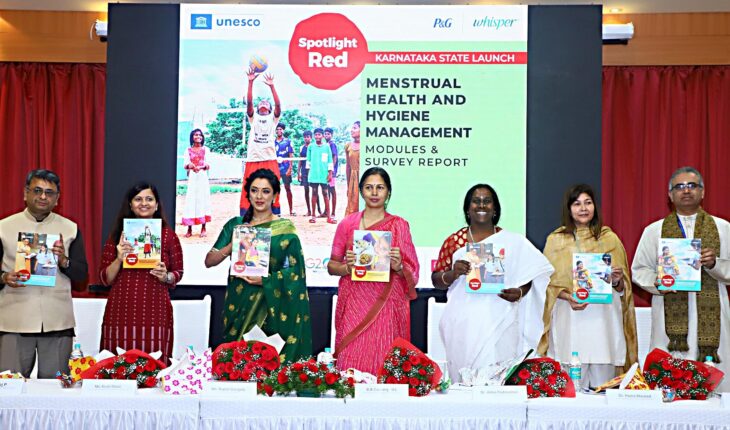Bengaluru : Amrita Vishwa Vidyapeetham Collaborates with UNESCO to launch Menstrual Health and Hygiene Campaign in Bengaluru. Amrita Vishwa Vidyapeetham, one of India’s top ten universities and UNESCO India have joined forces to launch a campaign aimed at raising awareness about menstrual health and hygiene management, particularly among women, including young girls attending school Bengaluru. Introducing five teaching-learning modules developed by UNESCO India with Procter & Gamble, Whisper, the campaign was nationally inaugurated at Amrita Hospital, Faridabad on the 8th of June 2023. These modules address the various challenges associated with menstrual health and hygiene management, such as disability, gender, educators, young adults, and nutrition.
#KEEPGIRLSINSCHOOL Campaign initiative-Titled “Spotlight Red,” the teaching-learning modules offer comprehensive resources and strategies for learners, educators, menstruators, and community leaders. Their purpose is to enhance understanding and skills related to menstruation management while fostering awareness about its societal impact. The modules aim to empower adolescents from diverse backgrounds, including girls with disabilities, by providing them with access to period and puberty education. Moreover, they seek to create a supportive environment through interventions at the school, state, and national levels, enabling these adolescents to continue their education.
During the event, renowned Indian television actress, Mrs. Rupali Ganguli, said, “Today, 1 in 5 girls drop out of school due to a lack of menstruation education and products. Shockingly, 70% of girls are unaware of periods when they first experience them. Even mothers who are girl’s closest friends, teachers, lack knowledge about the science of periods. I take immense pride in collaborating with Whisper and UNESCO to unveil inclusive and exhaustive teaching modules. All of us can be changemakers and contribute in our own small ways to ensure that the daughters of this country can attend school and experience their first period without confusion or embarrassment. They should be able to live, play, and study with confidence and comfort. I am glad that I got the chance to spread awareness about menstrual hygiene and health and be the changemaker.”
Dr. Huma Masood, Gender Specialist at UNESCO New Delhi, in her address to gathering including students said, “It is time to acknowledge the alarming statistics: an estimated 23 million girls drop out of school each year due to the lack of proper menstrual health and hygiene management. This partnership marks a crucial step forward in ensuring that every learner, every menstruator, is empowered and no one is left behind. With a comprehensive approach combining education and advocacy, we have developed five teaching learning modules dedicated to addressing this issue. Our first thematic area focuses on menstrual health and hygiene for gender empowerment, recognizing the gendered impact of menstruation on all genders. We firmly believe that by incorporating a gender lens, we can create a more inclusive and equitable educational environment. We have also developed a module that covers age-appropriate, rights-based, and skill-based education for early childhood care to tertiary education. Through critical thinking, discussions, and decision-making, we aim to instill a sense of empowerment and reflection in young minds.”
While sharing her experience, Dr Akkai Padmashali, Transgender rights activist, said, “I was born male, but I transformed into a female. I yearned to understand what it truly means to be a woman. But being a woman is not as simple as it seems; it means fighting against patriarchy, dominance, and societal expectations.




